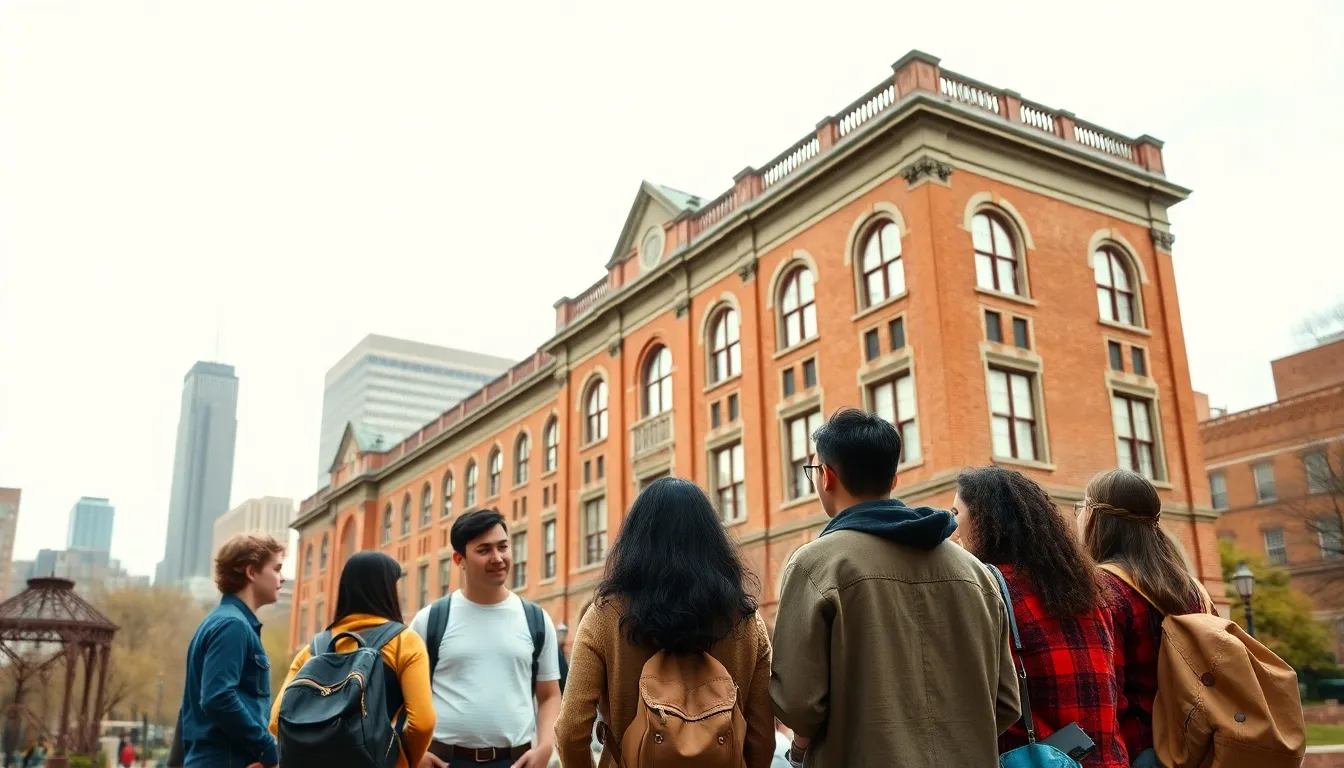Boston isn’t just a city; it’s a college lover’s paradise. With its rich history and vibrant culture, it’s no wonder that students flock to this academic haven. From the cobblestone streets to the iconic skyline, the city boasts a staggering number of colleges, each one offering unique experiences and opportunities.
Table of Contents
ToggleOverview of Colleges in Boston
Boston is home to over 35 colleges and universities, creating a vibrant academic community. This number includes prestigious institutions, large public universities, and small liberal arts colleges. Students benefit from diverse educational programs, each tailored to a variety of academic interests.
Harvard University, one of the oldest and most renowned Ivy League schools, attracts students from around the globe. Boston University, with its strong research programs and extensive resources, ranks among the largest universities in the United States. Additionally, Massachusetts Institute of Technology (MIT) excels in science and technology fields, contributing significantly to innovation and entrepreneurship.
Smaller colleges, like Emerson College and Suffolk University, offer focused programs with personalized attention. These institutions emphasize creative arts and urban studies, fostering a unique learning environment. Furthermore, community colleges such as Roxbury Community College provide accessible education and workforce training.
The geographic concentration of these colleges enhances collaboration and networking opportunities. Organizations often help students engage with local businesses and industries, forging pathways for internships and job placements. Students and faculty alike contribute to Boston’s vibrant culture through research initiatives and community service.
The presence of numerous colleges transforms Boston into a bustling student city. Life here buzzes with academic events, cultural activities, and extracurricular options. This environment supports students professionally and personally, making it an ideal location to learn and grow.
Types of Colleges in Boston

Boston features a variety of colleges, each offering unique educational experiences. The city accommodates public, private, and community colleges, contributing to its diverse academic landscape.
Public Colleges
Public colleges in Boston provide state-funded education. The University of Massachusetts Boston represents the most notable example, offering programs in fields like science and humanities. These colleges typically feature lower tuition rates for in-state students. Various academic resources and support services enhance the student experience. Opportunities for research and community engagement allow students to integrate into local contexts. Many public colleges emphasize workforce development, aligning their curricula with workforce needs.
Private Colleges
Private colleges in Boston offer specialized expertise and smaller class sizes. Institutions like Harvard University and Boston University lead the way in research and innovation. Students often benefit from strong networking opportunities due to the extensive alumni networks. Elite private colleges facilitate rigorous academic programs across diverse disciplines. Many of these institutions provide financial aid and scholarship options to support students. Campus life at private colleges also typically includes vibrant extracurricular activities, enriching the overall educational experience.
Community Colleges
Community colleges in Boston play a crucial role in accessible education. Institutions like Bunker Hill Community College offer associate degrees and vocational training. These colleges cater to diverse student backgrounds, including working professionals seeking skill enhancement. Flexible course schedules accommodate students balancing work and study, fostering a supportive learning environment. Community colleges often provide pathways to four-year institutions, allowing students to transition smoothly toward bachelor’s degrees. Affordability remains a key advantage, enabling wider access to higher education.
Major Colleges and Universities
Boston boasts a rich array of prestigious colleges and universities. Students benefit from a vibrant academic atmosphere created by these esteemed institutions.
Harvard University
Harvard University stands out as one of the world’s leading educational institutions. Located in Cambridge, it offers undergraduate and graduate programs across fields like law, business, and the sciences. Over 20,000 students pursue advanced knowledge, driven by a commitment to discovery and innovation. Students gain access to extensive resources, including renowned libraries and research facilities. Numerous alumni have made significant contributions to society, showcasing the university’s impact on various sectors globally.
Boston University
Boston University ranks among the largest private universities in the United States. With over 36,000 students, it provides diverse academic programs, including liberal arts, business, and health sciences. The campus features a lively atmosphere where students participate in various extracurricular activities and cultural events. Faculty members include prominent scholars and practitioners who enhance the learning experience. Students often benefit from the university’s strong connections to industries in Boston, facilitating internships and job opportunities.
Northeastern University
Northeastern University emphasizes experiential learning through cooperative education programs. More than 20,000 students engage in work placements, gaining practical experience alongside traditional coursework. Located in the heart of Boston, the university offers extensive research opportunities and a wide range of undergraduate and graduate programs. Students experience a vibrant community, enriched by international perspectives and cutting-edge initiatives. The institution focuses on preparing graduates for successful careers in an ever-evolving job market.
The Impact of Colleges on Boston
Colleges significantly shape Boston’s landscape. Their presence influences the economy and enriches the cultural fabric of the city.
Economic Contributions
Colleges generate billions in economic impact annually, driving job creation and local business growth. With over 35 colleges and universities located in the area, they employ thousands of individuals, both directly and indirectly. College students, estimated at over 150,000, inject substantial spending into local businesses, from housing to food and entertainment. Research initiatives at these institutions also attract funding, fostering innovation that benefits various sectors. In addition, partnerships between colleges and industries enhance workforce development, aligning educational programs with local economic needs.
Cultural Influence
Colleges contribute to Boston’s vibrant cultural scene. Educational institutions host numerous events, such as lectures, art exhibitions, and performances, attracting both students and the public. The diverse student population brings together unique backgrounds, enhancing the city’s multiculturalism. Local traditions thrive through student involvement in community service and social activities, reinforcing connections between colleges and the city. Festivals and cultural events, organized by these institutions, further enrich the local culture, creating an engaging atmosphere that reflects the city’s dynamic spirit.
Boston’s rich tapestry of colleges and universities makes it a unique destination for students seeking higher education. With over 35 institutions offering diverse programs and experiences, the city stands out as a beacon of academic excellence. The collaboration among these schools fosters innovation and community engagement, enhancing both personal and professional growth.
As students immerse themselves in Boston’s vibrant culture, they not only gain knowledge but also contribute to the city’s dynamic economy and cultural landscape. This thriving academic environment ensures that Boston remains a top choice for those pursuing their educational dreams.



